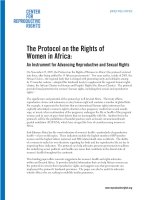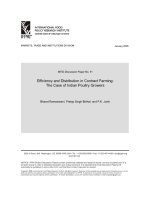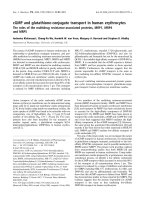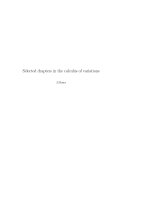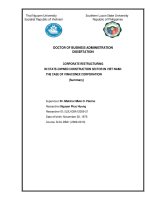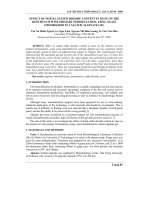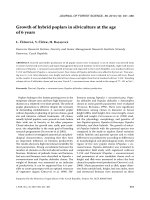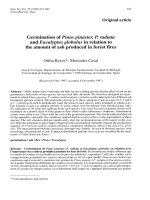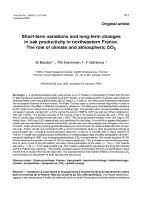Singaporean indian women in waiting singlehood, the calculus of care and geographies of being family
Bạn đang xem bản rút gọn của tài liệu. Xem và tải ngay bản đầy đủ của tài liệu tại đây (1.3 MB, 321 trang )
i
SINGAPOREAN-INDIAN WOMEN IN WAITING (?):
SINGLEHOOD, THE CALCULUS OF CARE AND
GEOGRAPHIES OF BEING ‘FAMILY’
KAMALINI RAMDAS
(MA, NUS)
A THESIS SUBMITTED FOR THE DEGREE OF DOCTOR OF
PHILOSOPHY
DEPARTMENT OF GEOGRAPHY
NATIONAL UNIVERSITY OF SINGAPORE
2012
ii
Declaration
I hereby declare that this thesis is my original work and it has been written by me in
its entirety. I have duly acknowledged all the sources of information which have been
used in the thesis.
This thesis has also not been submitted for any degree with any university previously.
____ _____ ___24 April 2013________
Signature of Candidate Date
Kamalini Ramdas
Name of Candidate
iii
ACKNOWLEDGEMENTS
This thesis would not have been possible without the support of and encouragement
from the following people:
My thesis supervisor Professor Brenda Yeoh for her guidance and wisdom, and for
being generous with her time.
My thesis committee members Associate Professors Tracey Skelton and Pow Choon
Piew. Thank you for providing feedback on my written work.
Colleagues from the Social and Cultural Geography Group at the Department of
Geography. I am grateful for your critical input during various presentations.
Colleagues past and present who were part of the Changing Landscapes of Singapore
‘crew’. I could not possibly have written this thesis without your
kindness and understanding.
My gratitude and appreciation also go out to the administrative staff of the
Department of Geography: Lai Wa, Mui Gek and Pauline.
Special thanks go out to “intimate others” who helped by taking on the load at home
and at work. Thank you for listening when I needed to vent, and for your words of
comfort over countless cups of coffee and glasses of wine: Alan, Alex, Arlene,
Brenna, Chih Yuan, Chuan Fei, Dad, Deidre, Elaine, Joanne, Kas, Hamzah, Han She,
Hedwig, Mum, Nerisa, Nicola, Noor, Peilin, Shirlena, Tracey and Yulin.
Alex, Brenna, Jay, Mark, and Bibi, thank you for opening your homes to me in
Melbourne, London and New York.
Finally, I would like to thank the single Indian women who agreed to being
interviewed. This thesis would not have been possible without your stories.
iv
Table of Contents
Page
Thesis Summary 1
List of Tables 3
Chapter 1: Introduction
1.1: Starting Point: Breaking the Silence 4
1.2: Critiquing the Biopolitics of Family in Mobile Times 6
1.3: Background, Research Aims and Questions 13
1.4: The Way Forward 16
Chapter 2: Singlehood and the Transnational Politics of Waiting:
A Feminist Critique of the Biopolitics of Family and
Calculative Technologies of Care
2.1: The “Problem” of Single Women and the Biopolitics
of Family 19
2.2: Biopolitics of Family in a Mobile World: Transnational
Families, Care and Responsible Citizenship 21
2.3: Contesting the Biopolitics of Family: Choice, Sexuality
And Intimate Citizenship 28
2.4: Race, Nation and the Biopolitics of Family: A Postcolonial
Critique 31
2.5: Space, Time, Waiting and (im)Mobility:
A Feminist Perspective 33
2.6: Conceptual Framework: Feminist Ethics of Care and
a Transnational Politics of Waiting 40
Chapter 3: Gender, Race and Nation: Single Indian Women in
Globalising Singapore
3.1: Marriage, Fertility and Singlehood in Globalising
Singapore 47
3.2: Race, Gender and Nation: The Biopolitics of Family
in Globalising Singapore 53
3.3: Single Singaporean-Indian Women and the Pressure
to Marry 61
3.4: Inter-ethnic marriages and Nation: The “Problem”
of Single Indian Women in Globalising Singapore 66
3.5: Setting the Stage: Graduate Single Singaporean-Indian
Women Destabilising the Biopolitics of Family 72
v
Chapter 4: Methodology
4.1: Rationalising the Research: Making the Personal Political 74
4.2: Feminist Methodology: The Politics and Ethics of
Speaking for the Other 78
4.3: Speaking from the Inside: Emotions and Discursive
Contradictions 82
4.4: Researching Emotions and Emotional Research:
The Challenges of Insider Research 90
4.5: The Relationality of Research: The Emotional Politics
of Seeing the Self in the Other 94
Chapter 5: When Race Counts: Singaporean-Indian Women, Tradition,
Modernity and (not) Marrying for Nation and Community
5.1: Race, Gender, Nation and Geography: Singapore’s
CMIO Strategy 96
5.2: Re-centering Race: Double-Exclusion and
Discursive Contradiction 102
5.3: The Singaporean State and Singaporean-Indian women
who (do not) have it all: Singlehood as Modernity’s
Success and Failure 105
5.4: Good Indian Mothers and Daughters: Doing Modernity
and Tradition for Community 119
5.5: Doubly Excluded but not Disempowered 136
Chapter 6: Is Blood Thicker than Water?: Single Singaporean-Indian
Women and the Geographies of Being ‘Family’
6.1: Proximity and Distance: The Biopolitics of Family and
Care in Transnational Times 139
6.2: A Feminist Ethics of Care: Critiquing Care’s Calculative
Technology 142
6.3: Blood: The Transnational Experience of
Being Family and a Feminist Ethics of Care 146
6.5: Water: Friendship and Care Beyond the Familial 155
6.6: Race, Feminist Ethics of Care and the Transnational
Strategies of Being ‘Family’ 164
vi
Chapter 7: Women in Waiting?: Singlehood, Marriage, and
Family in Singapore
7.1: Marriage and Compulsory Heterosexuality: Singlehood
as “Waiting” 168
7.2: Why Punctuate?: Making Space for the Emotional and
Foregrounding the Struggles in an Intimate Single Life 173
7.3: Punctuations: The Spatio-temporalities of Intimacy that
Make Up Care’s Calculus 177
7.3.1: Dating and Singlehood: Here and There are
(not) so different 180
7.3.2: Not Married and Not Waiting: No Time Left
for Children but Who’s Counting? 190
7.3.3: Choosing Singlehood: Sexually Intimate
Relationships Without Marriage 196
7.4: Punctuations and the Transnational
Politics of Waiting 203
Chapter 8: Conclusion
8.1: Factoring Emotions into the Equation: Feminist Care
Ethic and the Intensities of Care 207
8.2: Not the Biopolitics of Family but the Emotional Politics
of Race: Desire Rather than Expectation 209
8.3: Punctuations and the Transnational Politics of Waiting 213
References 218
Appendix A: Summary Background of Interviewees by City 254
Appendix B: Aide Memoire 266
Appendix C: Excerpts of Interviews by Themes 282
1
Singaporean-Indian Women in Waiting (?): Singlehood, the Calculus of Care
and Geographies of Being ‘Family’
Thesis Summary
The thesis provides a critique of the biopolitics of family in a globalising world. It
examines how gender, sexuality and race are implicated in this biopolitics where
practices of familial care become enshrined in a calculative technology that allows the
state to connect often disparate members within a family. It is a biopolitics that
destabilises the friction of distance and time, and enables people and places to
become held together through the intimate practices of marriage and child-bearing
within marriage. Specifically, the thesis engages with how single Singaporean-Indian
women contest, negotiate and sometimes reproduce constructions of them as “women
in waiting”. In particular, it shows how the notion of singlehood as waiting is crucial
to the abovementioned biopolitics of family.
The thesis argues for the need to take a more critical view of love and formations of
“family” in a global era (Harker and Martin, 2012; Oswin and Olund 2010; Pratt and
Grosner, 2006; Valentine, 2008). It focuses on the spatio-temporalities that inform
and are informed by how we become family, and the implications this in turn has for
how we become community. By locating singlehood at the nexus of caring
relationships between the individual and intimate other, the thesis problematises the
Singapore state’s calculative and racialised biopolitics of family. It focuses instead on
how the relationality of care between single Singaporean-Indian women, their parents
and friends cannot be confined to such a calculative logic, and instead focuses
attention on how community is constantly contested and negotiated. Drawing from in-
depth interviews with single Singaporean-Indian women in Singapore, Melbourne
2
and London, the thesis re-centres race and the emotional aspects of care by
interrogating how and why these women are portrayed as incomplete, occupying a
cusp where they are perceived as waiting for marriage. The thesis shows how
singlehood as experienced by the women is often more complex than the status of
‘waiting to marry’ that is implied in the state’s biopolitics.
The thesis makes use of a feminist ethics of care to consider the ways in which care
for the self and other are mutually intertwined, and pays attention to the moral context
in which decisions are made about how to care. In this way, it foregrounds the spatial
concepts of proximity and distance as well as the temporality that give rise to a
transnational politics of waiting. The thesis makes use of punctuations to capture the
multiplicity of spatio-temporalities inflected in the women’s experiences of
singlehood. Punctuations are used to reflect the speeding up and slowing down of
single Indian women’s lives as they balance their own need alongside their desire to
care and be cared for by intimate others. They capture the women’s experiences of
care in terms of intensities rather than confining care to a zero-sum logic alone.
Punctuations destabilise the mutually reinforcing binaries of single/married with
being in Singapore or abroad. Through punctuations, it becomes possible to focus on
the more elastic “present-ness” of being single across time and space, rather than see
singlehood only ever as lack.
3
List of Tables
Page
Table 3.1: Number of Marriages, Singapore 48
Table 3.2: Singapore’s Total Fertility Rate 51
Table 3.3 Resident Female Graduates by Ethnicity 64
Table 3.4: Ethnic Composition of Resident
Population, (DoS, 2011) 67
Table 3.5: Inter-ethnic Group Marriages by Ethnic Group, 2010 69
Table 3.6: Inter-ethnic Marriages Under Women’s Charter
Breakdown by Ethnicity of Spouse for Indian Brides and Grooms 70
Table 4.1: Number of interviewees broken down
by age-group and city 88
4
1. Introduction
1.1 Starting Point: Breaking the Silence
I trace the reason for embarking on this thesis on singlehood to a conversation I had
with May (not her real name). May, who is Indian and Singaporean, was in her late
30s, and at the time had been living abroad for almost 10 years in city X. Most of her
family was based in Singapore, although her younger sister was married and living in
city Y. May was single, financially well-off, independent and had a successful career.
However, during our conversation, she shared that in spite of her successes in life so
far, she did not feel as though she counted as an adult in the eyes of her parents. She
shared a particular incident that stood out in her mind about the time she was
expected to share a hotel room with her parents during a family gathering abroad. The
incident drove home the point that her parents still saw her as a child, and that her
younger sister, who was now married, would never be treated that way. When the
incident took place, May had already been living abroad for two years. She had
grown accustomed to living on her own, and making important decisions for herself.
Decisions that included buying her own apartment in Singapore, and renting a place
to live overseas where she would soon work at a new job. May was not averse to the
idea of being married. She had been on dates with men, some of which had become
relationships, but none of them had ever ended in marriage. May did not like talking
to her parents or relatives about the details of her intimate relationships with the men
she was dating. Yet her silence about these matters, and her unmarried status, marked
her as having “failed” at this aspect of her life.
5
At the time May and I spoke, I remember thinking that while both our lives were
different in many ways, our feelings about how we were treated because of our
unmarried status were somewhat similar. I was in my mid-30s and based in
Singapore. I had moved out of my parents’ apartment and had been living
independently for almost four years. At the time, I was two years into a relationship
with my female partner. Although, I was in a committed relationship, I continued to
be asked about when or whether I was going to marry. I was not out of the closet to
my immediate family and many of my relatives, and so in their eyes, I was single.
Like May, I too did not want to share information about my intimate relationship. I
found being questioned about this aspect of my life, and judged as a failure very
stressful and frustrating. Though I was gay and living in Singapore with my partner,
and May was straight and living in city X, we both experienced the stresses of being
“single” in different ways. We were often judged as not being proactive enough or too
picky. And though our personal lives were sometimes complicated, like those of our
married counterparts (balancing work, family and our personal lives), we were often
still seen as ‘kids’ or women who did not have ‘real’ lives because we did not have
our own families. We were expected to live with our parents until we were married
and to care for them, and be cared for by them since we did not have families of our
own to care for, or a man who would care for us. My conversation with May became
the catalyst for thinking about whether there were other women going through
experiences similar to ours. I wondered what the value would be in connecting with
these other women to hear their stories. In what ways would their experiences be
similar or different to May’s and mine?
6
1.2 Critiquing the Biopolitics of Family in Mobile Times
Foucault writes that family is no longer just a model for good government in which
how a father manages the family becomes the modus operandi for how a sovereign
ought to behave. It has itself become an instrument for managing population.
(Foucault (trans.), 2004: 105). It is through family that the state is able to implement
techniques that discipline good behavior and responsibility in ways that minimize the
self vis-à-vis the other (Foucault, 1990a, 1990b, 2003 (trans.); see also Legg, 2005).
The self, in other words, becomes located within the family allowing for it to work
toward a greater good of which it is seen to be a part of even as it cares for itself.
According to Foucault the “care for self” means knowing “ontologically what you
are” and “of what you are capable” (Foucault, 1987: 119). It is an approach to care
that is “entirely centred on one’s self, on what one does, on the place one occupies
among others” (Foucault, 1987: 120). In Foucault’s iteration of the correct care for
the self, the latter is contextualized in terms of what the citizen, usually male, must do
in both the private realm as head of the household and in the public or civic realm as a
capable citizen (Foucault, 1987: 119). Such a framing of care for the self is one in
which there is a clear separation of the public/civic realm and the private. Such an
uncomplicated framing of care for the self is one which has often been criticized by
feminists for not acknowledging the role played by women in the private realm which
permits the male citizen to carry out his civic duties. This separation of public and
private prevents care from being acknowledged in terms of a relationality between
self and other. Instead, it perpetuates patriarchal norms of care that are exclusionary
rather than complementary.
7
In writing this thesis on singlehood, my primary aim is to provide a critique of the
biopolitics of family in the context of today’s highly globalising world where
individual mobility often results in more complex intimate relations and outcomes for
familyhood. My intention is also to connect with feminist geographers’ critique of
how women are affected by a patriarchal framing of space in which care and intimacy
are relegated to the realm of the private. Such a framing of space often results in
women, who are more often than not the primary care-givers in families, being made
invisible, their complex gender politics silenced. My research aims to contribute to
feminist literature that remains critical of how and why women’s intimate lives and
their relationships of care become located in the realm of the private (Bondi and
Domosh, 1998; Duncan, 1996; Richardson 1996). Specifically, the thesis argues for
the possibility of an alternative spatio-temporal framework for understanding care and
intimacy by focusing on the lives of single Singaporean-Indian women. It analyses
the specific spatialities and politics encountered and produced by gender, sexuality
and race as they relate to the intimate lives of these women. By focusing on
singlehood and relationships of care as experienced by single Indian women, the
thesis unpacks the gendered and racialised politics underlying familyhood and care. It
brings together literature on the feminist critique of the biopolitics of family and
postcolonial feminist literature on identity politics and community.
In particular, the thesis engages with how the biological construct of family is used as
a strategic tactic to produce a biopolitics of family that the Singaporean state uses to
anchor individuals to place, and fix fluid identities in increasingly mobile times. The
thesis argues that such a tactic is grounded in the possibility that identity can extend
from individuals and coalesce hierarchically into something larger: family, ethnic
8
community, and nation as a result of gendered familial roles and practices of care that
connect the emotional to the biological in strategic ways. However, the thesis also
iterates that the biopolitics of family this gives rise to is centred on marriage and
procreation within marriage, and relationships of care that do not accurately portray
the intimate lives of highly educated single Singaporean-Indian women. It attempts to
question how and why this happens by taking a relational approach to engaging with
the practices of care between single Singaporean-Indian women and intimate others,
and the emotional struggles that emerge as these caring relationships unfold around
notions of duty, responsibility, and what it means to be a good Indian daughter. The
thesis argues that being a good Indian daughter can often be stressful for the women
because it means balancing what the women want for themselves against what they
believe is expected of them by the state, the Indian community and their parents. A
key point that the thesis tries to make, however, is that being a good Indian daughter
cannot be seen as something that takes away from the women being able to live the
kind of lives they want to live. By emphasizing this point the thesis iterates the need
to pay attention to how race is constructed and reproduced as part of the biopolitics of
family in Singapore. By focusing on how spatio-temporally contingent relationships
of care cannot be neatly categorised into those that matter (family as an outcome of
marriage) and those that do not (friendship and intimacy outside the confines of legal
marriage), the thesis remains cautious of state and community constructions of what it
means to be family. Instead, it focuses on the practices and politics that underpin how
we become family and how friendships offer an alternative dimension to single
women’s intimate lives that may prove useful to also understanding how we become
community. In this way the thesis remains critical of state biopolitics and discourses
of familyhood that allow for the reterritorialisation of disparate members of the
9
transnational family and a bounded notion of ethnic community that remain crucial to
the state’s nation-building project. These, the thesis argues, are more often than not
dependent on a strategic prioritization of intimacy that is located in heteronormativity
and the socio-legal practice of marriage.
Feminist geographers remained critical of how such tactics of socio-biological
reproduction produce a particular formation of family that continues to marginalise
women (Hartmann, 1998; Jackson, 1996; Richardson, 1996; Yuval-Davis, 1997).
They critique how state discourses and practices of family operate to make biological
continuity and connectivity possible through the bodies of women who are often
constructed as vessels caring for and carrying the blood of the nation (Ahmed, 2004;
Nash, 2005; Nast, 2002). It is the myth of blood stemming from biological
reproduction, flowing from one citizen into another over time and space that ascribes
meaning to nationality jus sanguinis. Race, blood and nationality thus become
intimately intertwined, and gender and sexuality become co-opted to maintain the
relevance of statist definitions of family, community and nation (Ahmed, 2004;
Lubheid, 2009; Nast, 2002, 1998; Yuval-Davis, 1997; see also Anderson, 1983). The
construct of family becomes anchored in the practice of biological reproduction
between a man and a woman connected through the socio-legal practice of marriage.
It is a strategic practice that locates an individual’s most private, intimate and
emotional life in the public domain, enabling it to be used in the government of
population (Legg, 2005; Foucault, 2004 (trans.)). The site of biological reproduction
is, therefore, where the chrysalis of identity takes form, and is nurtured through
practices of care between individuals tied one to the other, becoming part of a larger
whole: family, community, nation.
10
As researchers both within and outside of geography have continued to become more
critically engaged with the notion of family, the idea that it comprises more than who
we are related to by blood may seem like less and less of a novelty (Friedman, 1998;
Plummer, 2003, 2001; Valentine, 2008; Weeks 1998; Weeks et al., 2001). Such a
critique is grounded in a feminist appraisal of hetero-patriarchal constructions of
family as a state project in which discursivities of gender, race and sexuality are
strategically applied and become situated within the natural/ scientific discourse of
sex, blood, race and genes (Nash, 2005, 2003; Nast, 2002, 1998; Povinelli, 2006). I
argue that such a critique of family is particularly powerful at a time when individuals
are more likely to be living outside their countries of birth with people they may not
be biologically related to. It has implications for the how place-based belonging is
ascribed in a rapidly globalising world. These constructions of belonging such as the
nation and ethnic community are dependent on the belief that it is possible for
individuals to be connected by blood, and for this connectivity to become internalized
and then transmitted ‘up-scale’ (e.g. from the individual, to family, community, and
nation). For example, Nash (2005) writes that the “flexible practice of kinship in
which the meanings of ‘nature’ or ‘blood’ are performatively produced”, and that the
“mutual naturalizations of kinship across scales of family, nation and humanity,
shapes what can legitimately cross the boundaries of the nation-state and what is
recognised as legitimate by the state” (Nash, 2005: 451).
Given the transnational context that migrants find themselves in, the strategic
deployment of social discursivities such as race, gender, and sexuality for the state’s
placed-based project of identity building becomes crucial. Much of the work in
11
migration by feminist geographers has, therefore, proven integral to revealing how
women are implicated in the state’s strategic portrayal of relationality to keep the
transnational family intact. Work by feminist geographers in migration research has,
for instance, shown how female migrants are more likely to experience exclusion
because of gendered familial roles. Women who are more often than not the ones who
are expected to provide care in the family, find the labour they perform is often
viewed as unproductive as it is tied primarily to the private sphere (McLaren and
Dyck, 2004). The literature shows how it is women who are often expected put their
lives on hold for the benefit of the heteronormative transnational family, and
consequently the nation because care and intimacy are strategically located in the
private sphere which is seen to be their domain (Olavarria, 2006; Shen, 2005; Yeoh
and Willis, 1999, 2004). By drawing attention to such gendered roles, feminist
scholars in migration research offer a critique of masculinist portrayals of mobile
women, and reveal how these portrayals are rooted in patriarchy. They show how
men and women encounter the mobile world differently, given that expectations of
each of them are different. As a result, migrant women are more often than not seen
as trailing spouses, and often forced to de-skill when the family migrates (Kofman,
2004; Kofman and Raghuram, 2006; Man, 2004; Purkayastha; 2005; Raghuram,
2004; Raghuram and Kofman, 2004). The state reinforces existing patriarchal norms
by putting in place control mechanisms that reinstate the gendered view of
citizenship. These include immigration laws and the migration point system, that
force women with skills of their own, to migrate as dependents. ‘Women unfriendly’
welfare policies have led to a demand for foreign domestic workers to perform the
work that working women cannot do. By implementing migration and employment
policies that value this type of work, the state further institutionalises the low status of
12
social reproduction (Calavita, 2006; Huang and Yeoh, 2003; Silvey, 2004a; Yeoh and
Huang, 1998).
Seen in this light, much of the existing migration research that is focused on women
stems largely from a critique of the masculinist discourse regarding what constitutes
work, and patriarchal notions of men and women’s roles and identities within the
family. The situation is further problematised by various other matrices such as class
and racial-ethnic ideologies which continue to be forged transnationally through
international labour networks and the discourse of the nation-state. As Silvey (2004a:
498) argues, “gender and difference are understood as crucial in defining the
identities of migrant groups, and migrants are understood to participate in producing
their own identities in the context of power relations and ‘community’ politics that
shape the possibilities of migrants as subjects”.
State, community and family efforts to ensure the survival of the transnational
heteronormative family, therefore, have significant implications for migrant women’s
lives. These efforts are grounded in a biopolitics of family premised on marriage
between a man and a woman, where each plays specific roles in meeting the financial
and emotional needs of the family unit, and by extension hold together the
transnational geobody of the nation-state. It is a biopolitics of family in which, I
argue, single women more so than men are cast as “waiting” by their families, their
community and the nation. These unmarried women are seen as particularly
dangerous as their bodies are portrayed as a wasted potential, vulnerable to sexual
pollution or disuse (Bieri and Gerodetti, 2007; Gallo, 2006; George, 2005; Willis and
Yeoh, 2003).
13
Within the literature on migration, single women are generally portrayed as not being
constrained by similar responsibilities as their married counterparts. Research on
mobile single women, therefore, tends to also be rooted in a patriarchal and
heteronormative bias that presents the lives of single women as less demanding than
those of their married counterparts. Nevertheless, there is also literature that engages
with how single women are required to undertake other familial responsibilities such
as contributing to the household income, filial piety and their duty to marry (Esara,
2004; Gaetano, 2008; George, 2005; Thang et al., 2002; Williams, 2005; Willis and
Yeoh, 2003). The thesis aims to speak back to existing research within migration in
which single women are seen as more footloose and able to escape the familial gaze
and expectations of them to behave in certain morally prescribed ways (Hardill, 1998;
Thang et al., 2002; Willis and Yeoh, 2003). While it is true that the women find room
to negotiate more space for themselves by migrating, there is also a desire to connect
with family and perhaps also maintain intimate ties with their family abroad even
though these same ties are sometimes seen by the women as constraining and limiting
when they are in their home country. By engaging with the experiences of single
women in Singapore and overseas, the thesis examines how time and space ‘open up’
for the women to differing extents in Singapore and abroad.
1.3 Background, Research Aims and Questions
The resident Indian community in Singapore currently comprises 9.2% (Singapore
Department of Statistics (DoS), 2011a). While this ethnic community is labeled
“Indian” in government policy and rhetoric, the community comprises more than
individuals with roots in India. In fact the community more accurately comprises a
14
multiplicity of individuals of South Asian descent that include but are not limited to
Tamils, Gujaratis, Punjabis, Sikhs, Sinhalese among others. By focusing on single
Singaporean-Indian women, the thesis remains critical of the essentialisation of race
implied in constructions of the Indian community as homogenous, ‘traditional’ and
one in which Indian women are expected to marry, have children within those
marriages and fulfill gendered care roles as mothers and daughters. By taking a multi-
sited approach, the thesis also draws attention to singlehood as part of a transnational
politics of waiting (see Chapter 2) and the spatio-temporalities these produce between
the three cities of London, Melbourne and Singapore, where the women I interviewed
are based. Rather than singlehood being seen only as “not married” or “freedom from
marriage”, the thesis engages with singlehood as an emotional struggle that takes
place over time and space as part of the caring relationships that develop between
single women and intimate others they may or may not be biologically related to. In
this way the thesis provides an alternative to the portrayal of singlehood as ‘lack’
within the prevailing biopolitics of family where marriage seems the only rational
end-goal. To fulfill the above agenda the thesis is guided by three key research
questions.
1) What does being single mean for Singaporean-Indian women? How are their
experiences of singlehood impacted upon by social discursivities such as
gender, sexuality and race? In what ways are these experiences the result of a
state and community sanctioned biopolitics of family? In answering this
question, I analysed different aspects of singlehood that extended to the
women’s work lives, dating, sexual intimacy, care-giving, friendship and
family. My aim is to show how singlehood is more complex than can be
15
encapsulated in the phrase “not married”. Instead of seeing single women as
“women in waiting” the thesis asks how and why they are seen as waiting, and
by whom?
2) What does the context of these women’s single status reveal about the caring
relationships they share with intimate others (family, lovers and friends)? For
instance, how do the women balance caring for their parents, who want to see
them married, against a desire to live the kinds of lives they want to live?
What are the strategies deployed by single women to manage the pressures
they face to marry by their parents, the Indian community and the Singapore
state? What role do friends play in their ability to do so? In attempting to
answer these questions, my aim is twofold: Firstly, I aim to critically
interrogate the notions of care and responsibility that underpin the prevailing
biopolitics of family in which the legitimacy of family is more often than not
located in heteronormativity and maintained through the socio-legal practice
of marriage. Secondly, my intention is to critically engage with the spatio-
temporalities that underpin the geographies of waiting. Here I refer primarily
to waiting as premised on a linear construction of time and space and the
implications these have on how care is conceived. How might an alternative,
more relational approach to care, provide an alternative to portrayals of them
as waiting?
3) What are the alternative spatio-temporalities of singlehood that these women’s
contestations and negotiations reveal? How do they allow for a deconstruction
and problematisation of singlehood as more complex than the status of “not
married” allows? How do these challenge the biopolitics of family and
16
problematise constructions of them as “women in waiting”? How does this
result in a transnational politics of waiting that draws upon the similarities and
differences of being single in Singapore, London and Melbourne? In
answering this question, my aim is to problematise state and community
biopolitics of family that have become crucial for holding together disparate
bodies in an era of heightened mobility. This is a biopolitics in which race,
gender and sexuality are strategically deployed to fulfill the identity-building
objectives of the state and Singaporean-Indian community. By deconstructing
and problematising singlehood as experienced by Singaporean-Indian women,
the thesis aims to provide a critique of the existing biopolitics of family in
Singapore and focus instead on how a relational approach to caring for the self
and other produces alternative spatio-temporalities of singlehood that
destabilise the linearity of time and space implied in waiting.
To answer these questions, I interviewed 39 graduate Singaporean-Indian single
women who were based in Singapore, London and Melbourne. By consulting this
group of women for their opinions about singlehood, my research aims to provide
these women with avenues for sharing their experiences and by doing so, provide
greater insight into their everyday lives and how they cope with balancing the desire
to live the kinds of lives they want to live alongside their desire to love and be loved
by intimate others.
1.4 The Way Forward
There are a total of eight chapters in the thesis. In the seven chapters that follow I
unpack further the complexities of a single life as experienced by graduate single
17
Singaporean-Indian women based in Singapore, Melbourne and London. In Chapter
2, I review three broad categories of literature on the biopolitics of family, the critique
of the biopolitics of family and the politics of waiting respectively. With respect to
literature that critiques the biopolitics of family, I focus primarily on literature that
problematise constructions of family, feminist engagements with care, and
postcolonial feminist critique that captures the potentially racialising elements of the
biopolitics of family. Drawing from these bodies of work, I then explain in detail the
conceptual framework for my thesis. I introduce the possibility for a transnational
politics of waiting grounded in a more relational calculus of care that draws from a
feminist ethics of care, and is different from the state’s biopolitics of family which is
rooted in what I call a calculative technology of care. Chapter 3 engages more directly
with the Singaporean-Indian community and aims to provide insight into why the
thesis focuses on this particular group of single women. Prior to the three substantive
analytical chapters, I provide the methodology that has guided the research process. I
explain how and why I made use of my insider status to conduct in-depth, face-to-
face, semi-structured interviews with women based in Singapore, London and
Melbourne (Chapter 4).
The subsequent analytical chapters are guided by three key issues. The first issue
pertains to how singlehood as experienced by Singaporean-Indian women is often
more complex than what the status of “not married” conveys. Instead, it needs to be
contextualized within a biopolitics of family that is not only gendered and
heteronormative but also highly racialised. I engage with how single Indian women’s
bodies are implicated in and perpetuate discourses of race crucial to the existing
imagination of the Singaporean nation. How do the women navigate, produce and
18
contest these co-optations of their racialised single bodies as they encounter their
intimate lives (Chapter 5)?
The next issue pertains to how single women invert the state’s logic of pragmatism by
engaging in a feminist ethics of care that distances their singlehood from a discourse
of lack that is the result of a biopolitics of family in which heteronormative marriage
is prioritised. The thesis shows that there is a spatio-temporality to how wanting to
love, care and be responsible for another exists alongside the need to insert the self
more directly within the state’s calculative technology of care (Chapter 6).
In the last of the analytical chapters, I engage specifically with the possibility of
alternative spatio-temporalities grounded in a more relational approach to care. Such
a production of space draws attention to a transnational politics of waiting between
single women and intimate others who may or may not include individuals they are
related to by blood. The thesis focuses on how singlehood is punctuated by emotional
intensities of caring for the self and other. These practices of care are influenced by
and have an impact on the production of time and space by focusing on the relational.
In this way the thesis destabilises linear representations of time and space that give
rise to a zero-sum logic of care and result in marriage being the rational end-point for
single women (Chapter 7). Finally, I conclude by providing a summary of the key
ideas raised in the thesis and how these contribute to and expand further on existing
research by feminist geographers that remains critical of the biopolitics of family and
care, and focuses instead on the geographies of friendship and intimacy by
foregrounding the integral role that race plays in framing our understanding of being
family and community in an increasingly mobile world (Chapter 8).
19
Chapter 2: Singlehood and the Transnational Politics of Waiting: A Feminist
Critique of the Biopolitics of Family and Calculative Technologies of Care
2.1 The “Problem” of Single Women and the Biopolitics of Family
Feminist research has continued to iterate that care is a crucial part of the biopolitics
of family as it enables the performance, practice and concretization of the ‘myth of
blood’ that connects disparate members of the ‘family’ both nuclear and national
(Nash, 2003; Ong, 1996; Yeoh et al., 2005). More often than not, familyhood
becomes located within care and the practice of marriage, thus allowing for the state
to successfully locate the self within larger groups that seemingly fold one into the
other: individual, family, community and nation. This is significant in an age of
migration and increasing mobility where more and more individuals live near people
they are not related to by blood. I argue that this is a crucial state tactic that needs to
be unpacked using a feminist lens.
Pratt and Yeoh (2003: 162) for example point out that a “descent-based theory of
nation (that) firmly locates national belonging in familial reproduction” is highly
“gendered in very significant symbolic ways” (Pratt and Yeoh, 2003: 162) because it
results in the strategic reduction of women’s bodies to cellular levels as a means of
maintaining racialised national boundaries (see also Nash, 2005; 2003; Nast, 2002;
1998; Yuval-Davis, 1997). More often than not it is the heterosexual family as
signified in “marriage, procreation and the traditional, middle-class nuclear family
(that) is commonly held up as a model of good citizenship, necessary for ensuring
national security and a stable social order” (Richardson, 2000: 80; Rich, 1980; for
contrast see Harker and Martin, 2012; Oswin and Olund, 2010). Such constructions of
